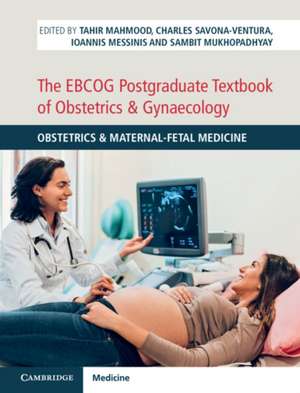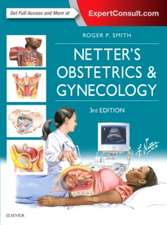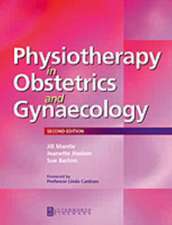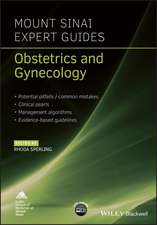The EBCOG Postgraduate Textbook of Obstetrics & Gynaecology: Obstetrics & Maternal-Fetal Medicine
Editat de Tahir Mahmood, Charles Savona Ventura, Ioannis Messinis, Sambit Mukhopadhyayen Limba Engleză Hardback – dec 2021
Preț: 627.24 lei
Preț vechi: 660.25 lei
-5% Nou
120.06€ • 130.46$ • 100.92£
Carte disponibilă
Livrare economică 31 martie-14 aprilie
Livrare express 15-21 martie pentru 91.18 lei
Specificații
ISBN-10: 1108495788
Pagini: 658
Dimensiuni: 221 x 284 x 36 mm
Greutate: 2.09 kg
Editura: Cambridge University Press
Colecția Cambridge University Press
Locul publicării:Cambridge, United Kingdom
Cuprins
Part I. Basic Sciences in Obstetrics: 1. Surgical Anatomy of the Female Pelvis; 2. Maternal Physiology During Pregnancy, including Immunology of Pregnancy; 3. Developmental Abnormalities of the Reproductive System and their Relevance to Obstetric Practice; 4. Pharmacology and Pharmacokinetics in Obstetric Practice; 5. Genetics in Feto-Maternal Medicine; Part II. Early Pregnancy Problems: 6. Bleeding in Early Pregnancy; 7. Acute Abdomen in Early Pregnancy; 8. Gestational Trophoblastic Disease; 9. Hyperemesis Gravidarum; Part III. Fetal Medicine: 10. Pre-Conception Care; 11. Ultrasound Scanning in the First Trimester of Pregnancy; 12. Prenatal Diagnostic Techniques; 13. Invasive Fetal Therapies; 14. Normal Fetal Growth and Fetal Macrosomia; 15. Fetal Haemolysis; 16. Antenatal Care of a Normal Pregnancy; 17. Screening for High-Risk Pregnancy; 18. Multiple Pregnancy; 19. Intrauterine Growth Restriction; 20. Fetal Origin of Adult Disease; 21. Ante-Partum Haemorrhage; 22. Obstetric Care of Migrant Populations; 23. Care of Women with Previous Adverse Pregnancy Outcome; 24. Preterm Prelabour Rupture of Membranes; Part IV. Maternal Medicine: 25. Hypertensive Disorders in Pregnancy and Eclampsia; 26. Obesity and Metabolic Syndrome in Pregnancy; 27. Screening for Gestational Diabetes Mellitus and Care of Diabetes Mellitus in Pregnancy; 28. Cardiac Disease in Pregnancy; 29. Respiratory Disease in Pregnancy; 30. Thromboembolism in Pregnancy; 31. Haemoglobinopathies in Pregnancy; 32. Kidney Diseases in Pregnancy; 33. Gastrointestinal Disorders in Pregnancy; 34. Systemic Lupus Erythematosus and Pregnancy; 35. Autoimmune Rheumatic Disorders in Pregnancy; 36. Thyroid Disease in Pregnancy; 37. Infections in Pregnancy; 38. HIV Infection in Pregnancy; 39. Acute Management of Sepsis in Pregnancy; 40. Psychological Disorders in Pregnancy; 41. Pregnancy after Solid Organ Transplantation; 42. Oral Health and Periodontal Diseases in Pregnancy; Part V. Intrapartum Care: 43. Normal Labour; 44. Issues during Labour for Migrant Populations; 45. Prolonged Pregnancy; 46. Induction of Labour; 47. Intrapartum Fetal Monitoring; 48. Augmentation of Labour; 49. Analgesia and Anaesthesia during Labour; 50. Preterm Labour; 51. Management of Multiple Pregnancy during Labour; 52. Abnormal Obstetric Presentation; 53. Intrapartum Emergencies; 54. Caesarean Section; 55. Instrumental Operative Obstetrics; 56. Maternal Collapse in Labour; 57. Management of Post-Partum Haemorrhage; 58. Birth Injuries and Perineal Trauma; 59. Management of Stillbirth; Part VI. Neonatal Problems: 60. Intrapartum Asphyxia and its Sequelae; 61. Short- and Long-Term Challenges of Neonatal Care; Part VII. Placenta: 62. The Placenta and its Association with Fetal Growth; 63. Placental Pathology; 64. Placental Adhesive Spectrum Disorders; Part VIII. Public Health Issues in Obstetrics: 65. Social and Cultural Aspects Affecting Pregnancy Outcomes in Migrant Populations; 66. Immunization in Pregnancy; 67. Saving Lives, Improving Mothers' Care; 68. Clinical Governance in Obstetric Practice; 69. Ethical Issues and Conflict in Maternal-Fetal Medicine and Obstetrics; 70. Legal Considerations in Obstetric Practice; 71. Research and Audit in Obstetric Practice; Part IX. Co-Morbidities during Pregnancy: 72. Management of Malignant and Premalignant Disease of the Cervix during Pregnancy; 73. Breast Cancer and Pregnancy: Diagnostics, Therapy, and Influence on Fertility and further Pregnancies; 74. Gynaecological Cancers and Pregnancy; 75. Non-Gynaecological Cancers and Pregnancy; 76. Simulation for Obstetrical Emergencies.
Descriere
This authoritative textbook provides a much-needed guide for postgraduate trainees preparing for the European Board and College of Obstetrics and Gynaecology (EBCOG) Fellowship examination. Published in association with EBCOG, it fully addresses the competencies defined by the EBCOG curriculum and builds the clinical practice related to these competencies upon the basic science foundations. Volume 1 covers the depth and breadth of obstetrics, and draws on the specialist knowledge of four highly experienced Editors and over 100 contributors from across Europe, reflecting the high-quality training needed to ensure the safety and quality of healthcare for women and their babies. It incorporates key international guidelines throughout, along with colour diagrams and photographs for easy understanding. This is an invaluable resource, not only for postgraduate trainees planning to sit the EFOG examination, but also for practising specialists looking to update their knowledge and skills to meet the ever-evolving complexity of clinical practice.




